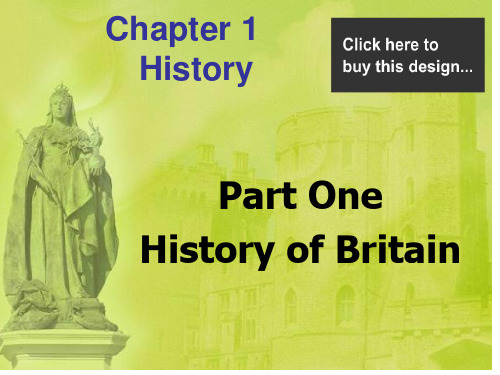英国历史与文化_英文版PPT
合集下载
英国的历史与文化ppt课件

英国外交
• 强调加强外交与安全政策的协调,成立由首 相直接领导的国家安全委员会;主张保持英 核威慑力量;将阿富汗问题列为外交第一要 务;巩固英美“特殊关系”;积极推进英在 欧盟的利益,重申英不加入欧元区、未经公 投不向欧盟让渡主权的立场;加大与中国、 印度等新兴力量的接触力度;呼吁推动通过 “两国方案”解决巴以冲突;重视国际发展 问题,坚持将国内生产总值的0.7%用于海外 援助目标。
• 五、英国教育
• 1.英国公学
• 2.牛津大学,剑桥大学,伦敦大学
• 六、英语语言与英国文学
• 1.英语的世界地位
• 2.英语英语的发展
• 3.英语词汇的来源
• 4.英国文学
精品课件
英国的名称
• Britain • Great Britain • the United Kingdom 【UK】 • England • The British Isles
• 所有这些都可以指代英国,然而都不太全面。UK是在联合国使用的名称, 是the United Kingdom lf Great Britain and Northern Ireland(大 不列颠及北爱尔兰联合王国)的简称。
精品课件
英国概况
• 大不列颠及北爱尔兰联合王国的国 土总面积为24.4万平方公里,总人 口为5800万。英国的地理位置非常 优越。
精品课件
英国简况
• 岛国,位于欧洲西部,由大不列颠岛(包括英格兰、 苏格兰、威尔士)、爱尔兰岛东北部和一些小岛组 成。隔北海、多佛尔海峡、英吉利海峡与欧洲大陆 相望。海岸线总长114英5国0公概况里。属海洋性温带阔叶 林气候。通常最高气温不超过32℃,最低气温不低 于-10℃。北部和西部的年降水量超过1100毫米, 其中山区超过2000毫米,中部低地为700-850毫米, 东部、东南部只有550毫米。每年2-3月最为干燥, 10月至翌年1月最为湿润。
英国文化介绍(英文版ppt)

英国茶文化 Tea Culture 英国茶文化
Accounts of its origins vary. Drinking a blend of black teas for breakfast is indeed a longstanding British custom.The practice of referring to such a blend as “English breakfast tea”appears to have originated nor in England but America, as far as Colonial times.
维多利亚女王
维多利亚是第一个以“大不 列颠和爱尔兰联合王国女 王和印度女皇”名号称呼的 英国君主
英国节日——圣·帕特里克节
圣帕特里克节(St. Patrick‘s Day)是每年 的3月17日,是为了纪念爱尔兰守护神圣帕 特里克。这一节日5世纪末期起源于爱尔兰。 人们大多按照传统习俗穿着黄色和绿色的 衣服,脸上也用绿色油彩描画出三叶苜蓿 的图样。传说中,圣帕特里克当年在爱尔 兰传教时,就是利用三叶苜蓿向人们讲述 基督教义的。燃放焰火也是庆祝圣帕特里 克节不可缺少的一个组成部分。当夜幕降 临,美丽的焰火在天穹划出一道道绚烂迷 人色彩,人们欢呼雀跃,相互送去温馨的 祝福。虽说圣帕特里克节是爱尔兰的传统 节日,但数百年来,随着爱尔兰后裔遍布 欧美各国,这一节日也渐渐成为西方国家 共同的节日。
伊丽莎白塔(英语:Elizabeth Tower,旧 称大本钟,BIG BEN),即威斯敏斯特宫 钟塔,世界上著名的哥特式建筑之一,英国 国会会议厅附属的钟楼(Clock Tower) 的大报时钟的昵称。是坐落在英国伦敦泰晤 士河畔的一座钟楼,是伦敦的标志性建筑之 一。钟楼高95米,钟直径9英尺,重13.5吨。 每15分钟响一次,敲响威斯敏斯特钟声。 自从兴建地铁Jubilee线之后,大本钟受到 影响,测量显示大本钟朝西北方向倾斜约半 米。 伊丽莎白塔于1858年4月10日建成,是 英国最大的钟。塔有320英尺高(约合97.5 米),分针有14英尺长 (约合4.27米), 大本钟用人工发条,国会开会期间,钟面会 发出光芒,每隔一小时报时一次。每年的夏 季与冬天时间转换时会把钟停止,进行零件 的修补、交 换,钟的调音等。
英国历史简介(课堂PPT)

.
26
玫瑰战争(Wars of the Roses) (1455年–1487年),或 称蔷薇战争,通常指英国兰开斯特王朝(House of Lancaster)和约克王朝(House of York)的支持者之间
为了英格兰王位的断续内战。两个家族都是金雀花王 朝(Plantagenet)皇族的分支,是英王爱德华三世的后
.
18
5
The Warrior of Vikings
.
19
6
.
20
7
The Vikings’ Castle
.
21
8
King Alfred the Great (r. 871-899)艾尔弗雷德国王(849899)
阿尔弗雷德是威塞克斯的国王。他打败了丹麦人, 并于公元879年与他们达成了友好协议。协议规 定丹麦人控制英格兰北部和西部(丹麦法区), 而他统治其他地区。他还劝服一些丹麦首领成为 基督教徒。 他因为建立了强大舰队,而以"英国海军之父"闻 名于世。他改组了"弗立德"(撒克逊军队),使 之更为高效。他将一本拉丁语的书翻译成英语。 同时他还建立了学校,并且阐明了法律制度。所 有这一切使他当之无愧于"阿尔弗雷德大王。"的 称号。
.
29
斯图亚特王朝
斯图亚特王朝(英语:The House of Stuart),初名为斯迪瓦特王朝(House of Stewart)是 1371年至1714年间统治苏格兰和1603年至1714年间统治英格兰和爱尔兰的王 朝。
统治领域:英格兰、苏格兰和爱尔兰
统治中心:爱丁堡、伦敦
君主:共15位苏格兰君主、8位英格兰君主、8位爱尔兰君主和1位大不列颠女王
《英国历史英文版》课件

World War II saw Britain stand
economic changes in the
alone against Nazi Germany, and
subsequent years.
the country's bravery in the face of
the Blitz remains an enduring
Stuart Era
James I and the Gunpowder Plot
King James I faced numerous challenges during his reign, including the infamous Gunpowder Plot in 1605.
Charles I and the English Civil War
Innovation and technological advancements led to a seismic shift in the way goods and services were produced, transforming the British economy and society adernize the country.
The decision to leave the European
Union in 2016 has plunged Britain
into years of uncertainty and
debate, as the country grapples
Victorian Era
Queen Victoria and the British Empire
Queen Victoria's reign marked the height of British power and influence, as the country enjoyed unprecedented prosperity and global supremacy.
historyofBritain英国历史 ppt课件

Introduction to British and American Culture
King Arthur (871-1042)
The best-known English legend the leader of “Round table” Knight
1)Time : During Anglo-Saxon invasion period 2) Contribution of King Arthur: United the British Isles Drove the Saxons back
Introduction to British and American Culture
Anglo-Saxon Britain (410-871)
Roman Britain (55 B.C.- 410)
Roman Invasion
Time Invaders
1 55 B.C
Roman Emperor Julius Caesar
2 54 B.C Roman Emperor Julius Caesar
3 43 A.D. Roman Emperor Claudius
Chapter 1 History
Part One History of Britain
The Beginning of Britain
1)the early British history is a history of ___? •A history of invasion 2)Who invaded Britain? •Roman •Anglo-Saxon •Viking •Norman
Only the king can take the sword from the stone
King Arthur (871-1042)
The best-known English legend the leader of “Round table” Knight
1)Time : During Anglo-Saxon invasion period 2) Contribution of King Arthur: United the British Isles Drove the Saxons back
Introduction to British and American Culture
Anglo-Saxon Britain (410-871)
Roman Britain (55 B.C.- 410)
Roman Invasion
Time Invaders
1 55 B.C
Roman Emperor Julius Caesar
2 54 B.C Roman Emperor Julius Caesar
3 43 A.D. Roman Emperor Claudius
Chapter 1 History
Part One History of Britain
The Beginning of Britain
1)the early British history is a history of ___? •A history of invasion 2)Who invaded Britain? •Roman •Anglo-Saxon •Viking •Norman
Only the king can take the sword from the stone
英国历史简介【优质PPT】

the significace:
It dealt a telling blow to villeinage and a new class of yeomen farmers emerged, paving the way for the development of capitalism.它沉重打击了封建 农奴制度,产生了全新的自耕农阶级,为资本主 义发展铺设了道路
Empire(1688--1990) • 5.Twentieth century of the English Nation
2021/10/10
2
一.the Origins of the English Nation
• 1.the Iberians.(伊比利亚
人)
————5000BC-55BC
The first known setters of Britain .In this period, more dramatic monuments were the henges, the
• 2.The roman built two great walls to keep the Pi cts(皮特人).They were
the Hadrian’s wall 哈德良长城(AD122)
running from carlisle to
Newcastle(从卡莱尔到纽卡斯尔),
and the Antonine wall 安东尼长城
kingdoms(王国时代).
2021/10/10
8
seven kingdoms(七王国)
• These seven principal
kingdoms of Kent, Es
sex, Sussex, Essex, E
It dealt a telling blow to villeinage and a new class of yeomen farmers emerged, paving the way for the development of capitalism.它沉重打击了封建 农奴制度,产生了全新的自耕农阶级,为资本主 义发展铺设了道路
Empire(1688--1990) • 5.Twentieth century of the English Nation
2021/10/10
2
一.the Origins of the English Nation
• 1.the Iberians.(伊比利亚
人)
————5000BC-55BC
The first known setters of Britain .In this period, more dramatic monuments were the henges, the
• 2.The roman built two great walls to keep the Pi cts(皮特人).They were
the Hadrian’s wall 哈德良长城(AD122)
running from carlisle to
Newcastle(从卡莱尔到纽卡斯尔),
and the Antonine wall 安东尼长城
kingdoms(王国时代).
2021/10/10
8
seven kingdoms(七王国)
• These seven principal
kingdoms of Kent, Es
sex, Sussex, Essex, E
(2024年)说国家英国介绍ppt课件

2024/3/26
7
02
英国经济现状与特点
2024/3/26
8
主要产业及优势领域
服务业
科技创新
英国经济的重要支柱,包括金融、教 育、医疗、旅游等领域,服务业占 GDP的比重超过80%。
英国在人工智能、生物科技、金融科 技等领域具有显著优势,拥有众多知 名的科研机构和高校。
制造业
英国拥有世界领先的制造业,特别是 在汽车、航空航天、制药等领域,如 劳斯莱斯、捷豹、路虎等品牌享誉全 球。
2024/3/26
申请流程
一般包括在线申请、提交 申请材料、参加语言考试 (如雅思)、获得录取通 知、办理签证等步骤。
注意事项
申请前需充分了解所申请 学校和专业的具体要求, 提前准备相关材料,确保 申请顺利进行。
14
国际交流与合作项目
01
伊拉斯谟计划
欧盟推出的国际学生交流项目 ,旨在促进欧洲各国之间的学
。
狄更斯
19世纪英国著名小说家,代表作 品包括《双城记》、《雾都孤儿 》等,以揭露社会问题和塑造鲜
明人物性格而闻名。
2024/3/26
17
博物馆、艺术馆等文化场所介绍
大英博物馆
世界上历史最悠久、规模 最宏伟的综合性博物馆之 一,收藏了来自世界各地 的珍贵文物和艺术品。
2024/3/26
国家画廊
位于伦敦特拉法尔加广场 ,收藏了众多13世纪至19 世纪的欧洲绘画和雕塑作 品。
2024/3/26
03
创新驱动发展成果
英国的创新能力得到了广泛认可,许多创新型企业在英国诞生并发展壮
大,如戴森、ARM等。同时,英国的创新生态也在不断完善,为创新
者提供了良好的环境和支持。
英国历史英文 ppt课件

was formed and changed its name to the Labor Party in 1906.
Colonial Expansion 殖 民扩张
1、Began with the colonization of Newfoundland in 1583.
2、By 1900,Britain had built up a big empire, “on which the sun never set”
Roman Britain
罗马统治下的英国(公元前55年—410年)
1、In 55BC and 54BC, Julius Caesar, a Roman general, invaded Britain twice. In AD 43, the Emperor Claudius invaded Britain successfully. For nearly 400 years, Britain was under the Roman occupation, though it was never a total occupation.
3、It saw the challenge of supremacy of the Roman Catholic Church by Reformation , the rise of Humanism ,the growth of large nation-states ,the farranging voyages of exploration and a new emphasis o the importance of individual.
1、In 1833,the Grand National Consolidated Trade
Colonial Expansion 殖 民扩张
1、Began with the colonization of Newfoundland in 1583.
2、By 1900,Britain had built up a big empire, “on which the sun never set”
Roman Britain
罗马统治下的英国(公元前55年—410年)
1、In 55BC and 54BC, Julius Caesar, a Roman general, invaded Britain twice. In AD 43, the Emperor Claudius invaded Britain successfully. For nearly 400 years, Britain was under the Roman occupation, though it was never a total occupation.
3、It saw the challenge of supremacy of the Roman Catholic Church by Reformation , the rise of Humanism ,the growth of large nation-states ,the farranging voyages of exploration and a new emphasis o the importance of individual.
1、In 1833,the Grand National Consolidated Trade
英国历史文化概况PPT-PPT文档资料

Barely 2 per cent of the workforce is employed in agriculture, and it contributes just 1 per cent of Britain’s gross domestic product, but Britain’s farmers provide twothirds of the country’s food needs, with much left over for export.
Natural Resources
Coal was one of the foundations of the industrial revolution.
Offered the opportunity for the generation of steam power
பைடு நூலகம்
But now, coal has been superseded by three other sources of energy: natural gas, oil, and nuclear power.
And a growing proportion of the nonwhite population consists of people born and raised in Britain, and who have been more fully assimilated into British society than their immigrant parents.
Political leaders approach the issue cautiously, worried about creating a backlash that would strengthen support for far-Right antiimmigration political parties.
有趣的英国文化PPT课件

棵矮小的苹果树,据说它就是牛顿悟“道”的“菩提树”。
剑 桥
68
剑桥
69
康桥
康河
70
三一学院-----这是 牛顿树的纯种子孙, 牛顿被苹果砸到脑 袋的那棵老树已经 死掉。后边的房子 是牛顿当年居住过 的房间。
71
72
圣保罗大教堂
1666年一场大火将原有的一座哥特式大 教堂毁于一旦。现存建筑是英国著名设计大 师和建筑家克托弗·雷恩爵士营建的。工程 从1675年开始,直到1710年才告完工,共花 费了75万英镑。为了这一伟大的建筑艺术杰 作,雷恩整整花了35年的心血。
(1)亨利七世礼拜堂(Henry VII Chapel):是威斯 敏斯特教堂最珍贵的宝藏,扇形圆拱屋顶以纯白石材建造, 装饰着中古时期巴斯勋位的骑士大十字勋章(Knights Grand Cross)的彩色旗帜。
(2)皇家空军礼拜堂(Royal Air Force Chapel): 有令人叹为观止的彩色玻璃窗,绘有每一个参加不列颠战 役的飞行中队的代表徽章。
面积百分比%
人口百分比%
英格兰是英国面积最大、人口最多的地区,
是全国政治、经济的中心。
16
英国常识
• 国花:玫瑰 • 国鸟:红胸鸽 • 国石:钻石 • 国球:板球
17
『 靠
• • • • •
北 北 外 海 殖海
海 渔
海 油
贸 发
运 发
民 帝
吃
场 田 达 达 国海 』
18
殖民帝国
在历史上英国是世界上最大的殖民帝国,在其殖民统 治鼎盛时期,其殖民地面积比本土面积大150倍,占有地球 面积和人口的1/4,号称“日不落帝国”。目前英国的海外 殖民地尚存13处,其数量仍占殖民国家首位。
剑 桥
68
剑桥
69
康桥
康河
70
三一学院-----这是 牛顿树的纯种子孙, 牛顿被苹果砸到脑 袋的那棵老树已经 死掉。后边的房子 是牛顿当年居住过 的房间。
71
72
圣保罗大教堂
1666年一场大火将原有的一座哥特式大 教堂毁于一旦。现存建筑是英国著名设计大 师和建筑家克托弗·雷恩爵士营建的。工程 从1675年开始,直到1710年才告完工,共花 费了75万英镑。为了这一伟大的建筑艺术杰 作,雷恩整整花了35年的心血。
(1)亨利七世礼拜堂(Henry VII Chapel):是威斯 敏斯特教堂最珍贵的宝藏,扇形圆拱屋顶以纯白石材建造, 装饰着中古时期巴斯勋位的骑士大十字勋章(Knights Grand Cross)的彩色旗帜。
(2)皇家空军礼拜堂(Royal Air Force Chapel): 有令人叹为观止的彩色玻璃窗,绘有每一个参加不列颠战 役的飞行中队的代表徽章。
面积百分比%
人口百分比%
英格兰是英国面积最大、人口最多的地区,
是全国政治、经济的中心。
16
英国常识
• 国花:玫瑰 • 国鸟:红胸鸽 • 国石:钻石 • 国球:板球
17
『 靠
• • • • •
北 北 外 海 殖海
海 渔
海 油
贸 发
运 发
民 帝
吃
场 田 达 达 国海 』
18
殖民帝国
在历史上英国是世界上最大的殖民帝国,在其殖民统 治鼎盛时期,其殖民地面积比本土面积大150倍,占有地球 面积和人口的1/4,号称“日不落帝国”。目前英国的海外 殖民地尚存13处,其数量仍占殖民国家首位。
《英国历史英文版》课件

Middle Ages
Summary
The Development and Transformation of Medieval England
Detailed description
medieval England experienced a transformation from feudal society to capitalism, and made tremendous progress in economy, culture, and technology. At the same time, this period was also filled with wars and political turmoil, such as the Rose Wars and the Hundred Years War between England and France.
During the Industrial Revolution
Summary
The Impact of the Industrial Revolution on Britain
Detailed description
The Industrial Revolution from the late 18th to early 19th century completely changed the face of Britain, making it the world's first industrialized country. The Industrial Revolution brought about a great increase in productivity, but
17世纪英国历史背景ppt课件

revolution. Its holding was considered the beginning of the British bourgeois revolution.
2、Stuart restoration(1660.2) In 1660 February, Stuart dynasty restoration. Although Charles II and James II
8
2 Literary comparison
Drama
The drama was strongly criticized by
the pure-hearted Puritans and moralists
Metaphysical poetry This poet to make
abandoned the era of sweet and vague,
John Donne 《 Songs and Sonnets 》 《 Holy Sonnets》
D rama attacked
Literary
This period of drama creation to revenge drama and farce-based comedy
k nights poetry Ben Jonson the Cavalier Poets
5
1 16th-17th century England
起义主要地点
6
2
Literary revolution
1、Metaphysical poetry 2、Knights of poetry 3、The drama was attacked
7
2 Literary revolution
2、Stuart restoration(1660.2) In 1660 February, Stuart dynasty restoration. Although Charles II and James II
8
2 Literary comparison
Drama
The drama was strongly criticized by
the pure-hearted Puritans and moralists
Metaphysical poetry This poet to make
abandoned the era of sweet and vague,
John Donne 《 Songs and Sonnets 》 《 Holy Sonnets》
D rama attacked
Literary
This period of drama creation to revenge drama and farce-based comedy
k nights poetry Ben Jonson the Cavalier Poets
5
1 16th-17th century England
起义主要地点
6
2
Literary revolution
1、Metaphysical poetry 2、Knights of poetry 3、The drama was attacked
7
2 Literary revolution
- 1、下载文档前请自行甄别文档内容的完整性,平台不提供额外的编辑、内容补充、找答案等附加服务。
- 2、"仅部分预览"的文档,不可在线预览部分如存在完整性等问题,可反馈申请退款(可完整预览的文档不适用该条件!)。
- 3、如文档侵犯您的权益,请联系客服反馈,我们会尽快为您处理(人工客服工作时间:9:00-18:30)。
– The Armada, 1588; the French, 1805, Nazi Germany, 1940
1.1 Geography: Weather
• Generally mild and temperate weather
– allows farming to flourish across the country – North: less fertile land, wetter – South: fertile land, drier
Celtic gods and goddesses
• Roman Britain .
– Christian merchants and traders arrived in England in the 1st century A.D, but made little impact.
– In the 2nd century, Christianity slowly spread.
– In the late 6th century, Christianity was introduced widely in England.
• Christianity: belief in one godhead, • The Celt’s Religion:belief in several gods • After Constantine’s conversion to Christianity, Polytheism (多神论)
Chapter 1 Early England
1. 2. 3. 4. 5. 6. Old Stone Age, 70,000—8000 BC Middle Stone Age , 8300—3500 BC New Stone Age , 3500—2500 BC Bronze Age, 2500—700 BC (Iberians) Iron Age, 700—100 BC (Celts) The Dawning of English History 150 BC—50
– to make the birth of Jesus Christ the dividing point
of world history
Gaius Julius Caesar
(July 13, 100 BC– March 15, 44 BC)
• a Roman military and political
• Hadrian’s Wall • Antonine Wall
Roman Influence:
The Romanisation of Britannia
1. 2. 3. 4. 5. 6. Roman laws, taxes, engineering skills Architecture Roman social system The Latin Language System of writing and numbering Introduced a system of organized government in towns 7. Brought the new religion Christianity to Britain
• • the lure of treasures to punish the Celts because of the help they rendered their fellow tribesmen in Gaul
– Results
•
•
failed because of weather
withdraw with hostages and prisoners
Britannia
monotheism (一神论)
Anglo-Saxon period
In the middle of the 5th century, Anglo-Saxons
settled here. English people owe much of their tradition, language, physical heritage to them (tall, fairhaired). Viking invasion: by the 8th, the Danish began to invade England in a successful way until Alfred the Great defeated them. King Alfred the Great (r. 871-899 阿佛列大 帝) He is often regarded as the first king of a united England.
1.1 Geography: Some Terminology
Official title
– United Kingdom of Great Britain and Northern Ireland – British Isles
• including Great Britain, the whole of Ireland, all the offshore islands
1.2 Early Settlers
• New Stone Age , 3500—2500 BC
– Stonehenge 史前巨石阵
• a monumental circular setting of large standing stones surrounded by an earthwork
• baths, temples, amphitheatres 竞技场, Roman aqueducts 高架渠 of roads to connect large towns
Roman roads: more than 5000 roads, a network
Roman toቤተ መጻሕፍቲ ባይዱn: Bath
Bath Abbey
Roman Invasion (55BC-410 AD)
3. Leaving in around 410 A.D.
– The Roman Empire disintegrated in 476 A.D.. – left behind a well established Celtic-Roman culture
An Introduction to British History and Culture
English History
• • • • • • • • • • • Prehistoric England Roman Britain (43-410) The Anglo-Saxons and Vikings (450-1066) Normans and Plantagenets (1066-1272) Lancaster and York (1272-1485) The Tudors (1485-1603) The Stuarts (1603-1714) Order and Disorder (1714-1837) Victoria and Empire (1837-1910) Peace and War (1910-1945) Contemporary Britain (1945)
Roman Soldiers
Resistance to Roman Occupation • For nearly 400 years Britain was under the Roman occupation, but it was never a total occupation.
– Roman troops often withdrew. – Resistance: the Picts – Two great walls to keep the Picts:
1.2 Early Settlers
• Hunters and gatherers
– Old Stone Age (Paleolithic), 70,000—8000 BC – Middle Stone Age (Mesolithic), 8300—3500 BC – New Stone Age (Neolithic), 3500—2500 BC
Chapter 2 Roman Britain
Roman Invasion (55BC-410AD)
British recorded history begins with Roman invasion.
– first landing in 55 B.C. led by Julius Caesar – complete control over the land in 43 A.D. – leaving in around 410 A.D.
leader
• played a critical role in the
transformation of the Roman Republic into the Roman Empire
Roman Invasion (55 BC - 410 AD)
1. First landing in 55 B.C. led by Julius Caesar – Reasons
Stonehenge
In Search of History 00:20 — 01:38
1.2 Early Settlers
• The Celts (Iron Age, 700—100 BC)
– from north-western Europe, ancestors of the highland Scots, the Irish and Welsh – Gaelic 盖尔语 : language of Celtic origin
Roman Invasion (55 BC - 410 AD)
2. Complete control over the land in 43 A.D.
1.1 Geography: Weather
• Generally mild and temperate weather
– allows farming to flourish across the country – North: less fertile land, wetter – South: fertile land, drier
Celtic gods and goddesses
• Roman Britain .
– Christian merchants and traders arrived in England in the 1st century A.D, but made little impact.
– In the 2nd century, Christianity slowly spread.
– In the late 6th century, Christianity was introduced widely in England.
• Christianity: belief in one godhead, • The Celt’s Religion:belief in several gods • After Constantine’s conversion to Christianity, Polytheism (多神论)
Chapter 1 Early England
1. 2. 3. 4. 5. 6. Old Stone Age, 70,000—8000 BC Middle Stone Age , 8300—3500 BC New Stone Age , 3500—2500 BC Bronze Age, 2500—700 BC (Iberians) Iron Age, 700—100 BC (Celts) The Dawning of English History 150 BC—50
– to make the birth of Jesus Christ the dividing point
of world history
Gaius Julius Caesar
(July 13, 100 BC– March 15, 44 BC)
• a Roman military and political
• Hadrian’s Wall • Antonine Wall
Roman Influence:
The Romanisation of Britannia
1. 2. 3. 4. 5. 6. Roman laws, taxes, engineering skills Architecture Roman social system The Latin Language System of writing and numbering Introduced a system of organized government in towns 7. Brought the new religion Christianity to Britain
• • the lure of treasures to punish the Celts because of the help they rendered their fellow tribesmen in Gaul
– Results
•
•
failed because of weather
withdraw with hostages and prisoners
Britannia
monotheism (一神论)
Anglo-Saxon period
In the middle of the 5th century, Anglo-Saxons
settled here. English people owe much of their tradition, language, physical heritage to them (tall, fairhaired). Viking invasion: by the 8th, the Danish began to invade England in a successful way until Alfred the Great defeated them. King Alfred the Great (r. 871-899 阿佛列大 帝) He is often regarded as the first king of a united England.
1.1 Geography: Some Terminology
Official title
– United Kingdom of Great Britain and Northern Ireland – British Isles
• including Great Britain, the whole of Ireland, all the offshore islands
1.2 Early Settlers
• New Stone Age , 3500—2500 BC
– Stonehenge 史前巨石阵
• a monumental circular setting of large standing stones surrounded by an earthwork
• baths, temples, amphitheatres 竞技场, Roman aqueducts 高架渠 of roads to connect large towns
Roman roads: more than 5000 roads, a network
Roman toቤተ መጻሕፍቲ ባይዱn: Bath
Bath Abbey
Roman Invasion (55BC-410 AD)
3. Leaving in around 410 A.D.
– The Roman Empire disintegrated in 476 A.D.. – left behind a well established Celtic-Roman culture
An Introduction to British History and Culture
English History
• • • • • • • • • • • Prehistoric England Roman Britain (43-410) The Anglo-Saxons and Vikings (450-1066) Normans and Plantagenets (1066-1272) Lancaster and York (1272-1485) The Tudors (1485-1603) The Stuarts (1603-1714) Order and Disorder (1714-1837) Victoria and Empire (1837-1910) Peace and War (1910-1945) Contemporary Britain (1945)
Roman Soldiers
Resistance to Roman Occupation • For nearly 400 years Britain was under the Roman occupation, but it was never a total occupation.
– Roman troops often withdrew. – Resistance: the Picts – Two great walls to keep the Picts:
1.2 Early Settlers
• Hunters and gatherers
– Old Stone Age (Paleolithic), 70,000—8000 BC – Middle Stone Age (Mesolithic), 8300—3500 BC – New Stone Age (Neolithic), 3500—2500 BC
Chapter 2 Roman Britain
Roman Invasion (55BC-410AD)
British recorded history begins with Roman invasion.
– first landing in 55 B.C. led by Julius Caesar – complete control over the land in 43 A.D. – leaving in around 410 A.D.
leader
• played a critical role in the
transformation of the Roman Republic into the Roman Empire
Roman Invasion (55 BC - 410 AD)
1. First landing in 55 B.C. led by Julius Caesar – Reasons
Stonehenge
In Search of History 00:20 — 01:38
1.2 Early Settlers
• The Celts (Iron Age, 700—100 BC)
– from north-western Europe, ancestors of the highland Scots, the Irish and Welsh – Gaelic 盖尔语 : language of Celtic origin
Roman Invasion (55 BC - 410 AD)
2. Complete control over the land in 43 A.D.
